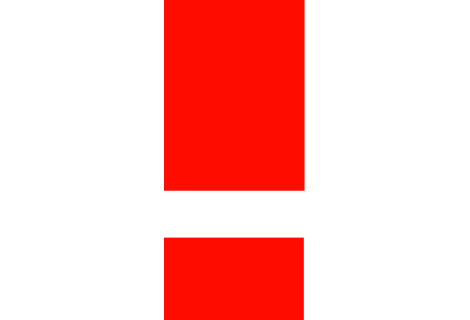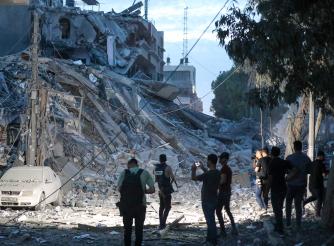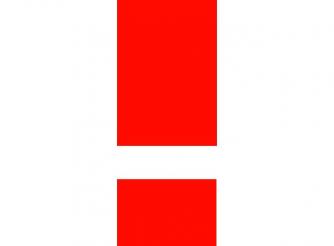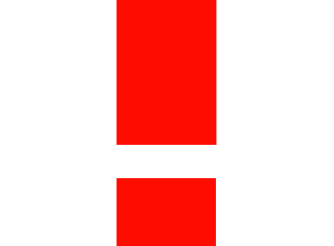Gaza’s children facing unimaginable trauma on World Children’s Day

“Children were killed. I was separated from my parents. I kept on running”: Gaza’s children facing unimaginable trauma on World Children’s Day
Today as the global community marks World Children’s Day, children in Gaza are struggling to survive amid inhumane conditions, while being killed at a horrifying rate. Over the last six weeks, one child has been killed every ten minutes on average – resulting in a devastating death toll of 5,500.
Children have been forced to witness horrific scenes amid unrelenting bombardment. Lafiza, 11, has been displaced multiple times with her family since October 7. Describing being displaced yet again from the school where she had been sheltering, she said:
“We were forced to leave the school under bombing and gunshot attacks. People were being killed in the streets. Children were killed. I was separated from my parents. I kept on running with everyone until I was reunited with them.
We then walked all the way from Gaza [city] to Rafah. [We] spent a night in the streets. We slept in the cold; We had no mattresses to sleep on, nor did we have covers.
We remained in the streets waiting for help until some people came and took us to [a] school [shelter].”
Children – who make up half of the 2.3 million population in Gaza - are having to live amid unimaginable conditions as the humanitarian situation worsens by the day. Every single person in Gaza is suffering from food insecurity, while 70% of people lack access to clean water, according to UNRWA. Children are becoming malnourished and underweight from a lack of food, and in many cases have no option but to drink brackish or contaminated water, leading to rising cases of gastroenteritis and diarrhoea.
With more than half of the population displaced from their homes, around 900,000 people are now being hosted at hugely overcrowded UN-run shelters, where – on average – 700 people are sharing a single shower, while 150 are sharing a single toilet, according to UNOCHA. Inevitably, illnesses such as diarrhoea and respiratory illnesses are spreading quickly, with children most vulnerable. In some places, due to the lack of fuel, sewage is now flowing down the streets, further heightening the risk of diseases.
Yasmin, mother displaced from her home in northeast Gaza, spoke about the conditions she and her children experienced when sheltering in a school near the Al-Shifa hospital. She said:
“We spent about 20 or 25 days there. The situation was very, very bad, there was no water for drinking or bathing. In 38 [days], my children have not bathed [more than] once or twice. This means that the children suffer from diarrhoea and are very tired. [They] have fevers and ear pain. There is no electricity, no water, no food, no drink, and not even a place to sleep like humans.”
Her family has since been displaced again and are now sheltering in a different school in the south. Yasmin said:
"There is no electricity, no food, nor anything. The basic necessities of life are not available. There is no soap for washing, no shampoo, no toothpaste, or any of the necessary supplies.
“When we arrived [here], there was bombing in the street. I don't know what to say. The children sleep and wake up. While sleeping, they are repeating: “shoot, died, shoot, died” This is our life.”
Nowhere is safe for children in Gaza. Over the weekend, Jabalia refugee camp – the largest camp in Gaza – was hit by airstrikes and at least 24 people who had been sheltering at a school there were killed. Today there are alarming reports of heavy fighting around the Indonesian hospital, which currently has at least 700 people – including medical staff and injured people – inside. We must be clear: schools and hospitals have protected status under international humanitarian law. They are safe havens, and they should never be targeted.
While the eyes of the world are focused on Gaza, it should not be forgotten that Palestinian children living under occupation in the West Bank are also seeing their fundamental rights violated. At least 53 children in the West Bank have been killed by the Israeli forces since October 7, and there are more than 200 children currently in detention, according to the Palestinian Prisoners Society. Meanwhile, children’s right to an education is being put at risk by the demolition of schools by the Israeli authorities and the threat of settler attacks.
Riham Jafari, Communication and Advocacy Coordinator at ActionAid in Palestine, said:
“World Children’s Day should be a joyous moment to recognise the power and potential of our youth. But today, children in Gaza have nothing to celebrate.
“For more than six weeks now, they have been trapped inside a living nightmare: forced to go to sleep hungry and thirsty to the sound of bombs falling all around them. Some have suffered horrific injuries from fallen debris and shrapnel from airstrikes. Others have lost their parents, their siblings, or even their entire family.
“The extent of the horror they are facing is difficult to comprehend and to bear, but we must not look away. For their sakes, we must keep calling for a ceasefire, now. Only a ceasefire will prevent more children’s lives being lost, and will mean that sufficient urgent humanitarian aid can enter Gaza so that children can get the food, water and medical supplies they so desperately need.”
ENDS
Contact the ActionAid press office on uk.media@actionaid.org or on 07753 973 486.
Riham Jafari is available as a spokesperson, please contact the press office to arrange.
About ActionAid
ActionAid is a global federation working with more than 41 million people living in more than 71 of the world’s poorest countries. We want to see a just, fair, and sustainable world, in which everybody enjoys the right to a life of dignity, and freedom from poverty and oppression. We work to achieve social justice and gender equality and to eradicate poverty.


